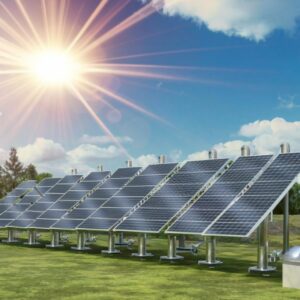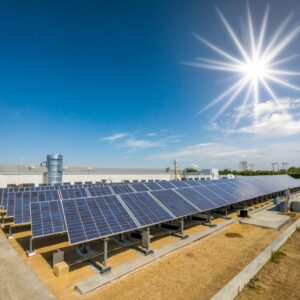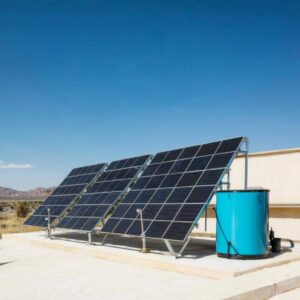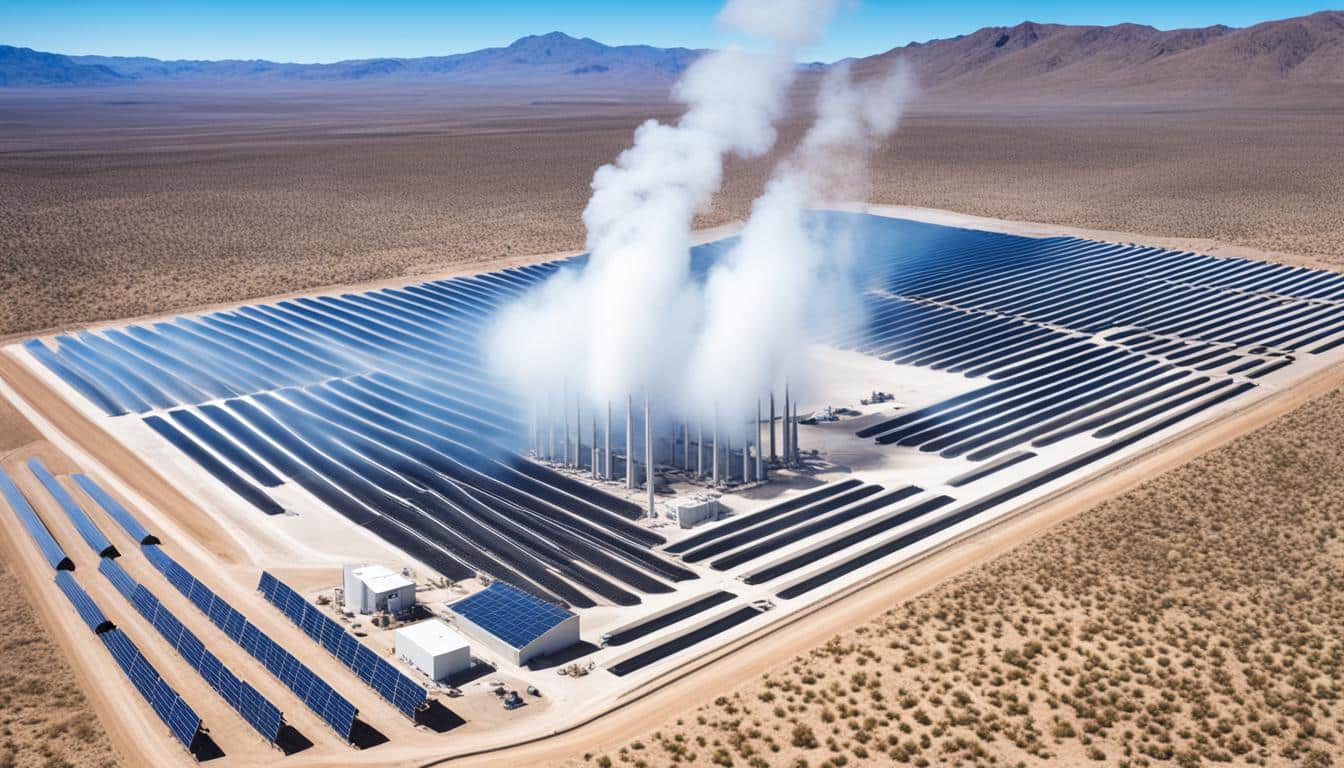
In today’s world, the need for sustainable and renewable energy sources has become paramount. As we strive to reduce our reliance on fossil fuels and combat climate change, geothermal energy and solar power have emerged as valuable contenders in the quest for clean energy generation. In this article, I will delve into the characteristics, benefits, and drawbacks of these two renewable energy sources.
Key Takeaways:
- Geothermal energy and solar power are sustainable power sources that contribute to reducing carbon emissions and environmental impact.
- Geothermal energy offers reliability, low emissions, and long operational lifespan, making it an attractive option for steady power generation.
- Solar power provides a clean and widely accessible energy source, harnessing the abundant sunlight for electricity generation.
- Both geothermal and solar energy have their advantages and disadvantages, including variable output in solar power and the requirement for suitable geothermal reservoirs.
- Understanding the characteristics and limitations of geothermal energy and solar power can help us make informed decisions regarding sustainable energy investments.
Advantages and Disadvantages of Geothermal Energy
Geothermal energy offers several advantages as a power source. One of the key benefits is its reliability, as geothermal power plants can operate continuously and are not affected by weather conditions. They provide reliable base load power, delivering a steady supply of electricity. Geothermal power plants also have a long operational lifespan, typically lasting for several decades with proper maintenance. Moreover, once a geothermal power plant is established, operating costs are relatively low compared to other forms of power generation. These factors make geothermal energy an attractive option for sustainable and reliable electricity generation.
In addition to its reliability, geothermal energy boasts several other advantages:
- Low Emissions: Geothermal power generation has minimal greenhouse gas emissions. Carbon dioxide emissions associated with geothermal energy are lower compared to fossil fuel-based power plants.
- Cost-Effective: Once a geothermal power plant is set up, the operating costs are relatively low as they require minimal fuel consumption and maintenance.
- Renewable Resource: Geothermal energy is a renewable resource as it relies on the heat from the Earth’s core, which is continuously replenished.
- Independence from Fuel Price Volatility: Unlike fossil fuel-based power plants, geothermal energy is not dependent on the fluctuating prices of oil or natural gas.
- Job Creation: The development and operation of geothermal power plants create employment opportunities in various stages, including exploration, construction, and maintenance.
However, geothermal energy also has its disadvantages:
- Location Constraints: Geothermal energy requires specific geological conditions to be feasible. It is only accessible in areas where there are geothermal reservoirs or hot springs.
- High Initial Cost: The initial capital investment required to construct geothermal power plants can be substantial, which may deter some developers.
- Environmental Impacts: While geothermal energy has lower emissions compared to fossil fuel-based power plants, the drilling and extraction processes can still have environmental impacts, such as the potential release of harmful gases and fluids.
Despite these disadvantages, geothermal energy remains a promising and sustainable power source with its reliable operation, low emissions, and favorable operating costs.

Advantages and Disadvantages of Solar Power
Solar power offers several advantages as a sustainable energy source. One of the key benefits is its low environmental impact, as solar power plants do not release greenhouse gases or air pollutants during operation. Solar energy is abundant and freely available, making it a renewable and widely accessible resource. The installation of solar panels on residential and commercial buildings can also contribute to the diversification of energy sources and reduce electricity costs for consumers.
Solar power plants can operate for long periods without interruption, providing a reliable source of electricity. However, it is important to note that solar power has some disadvantages as well. One drawback is its variable output, which depends on weather conditions and the availability of sunlight. During cloudy days or at night, the amount of electricity generated by solar panels decreases significantly.
Despite this limitation, advancements in solar technology, such as the use of energy storage systems, are being made to address the issue of variable output and ensure a consistent power supply.
Another disadvantage of solar power is the initial cost of installing solar panels. While solar energy is cost-effective in the long run due to reduced energy bills, the upfront expenses for purchasing, installing, and maintaining solar panels may be a barrier for some individuals and businesses.
However, despite these drawbacks, solar power remains a viable and sustainable energy solution, providing numerous benefits for both the environment and consumers.
| Advantages of Solar Power | Disadvantages of Solar Power |
|---|---|
|
|
Advancements in Solar Technology
Advancements in solar technology are continuously being made to address the limitations of solar power. Energy storage systems, such as batteries, are being integrated with solar panels to store excess energy generated during optimal conditions. This stored energy can then be utilized during periods of low sunlight or high electricity demand, improving the reliability and efficiency of solar power systems.
Additionally, researchers are exploring innovative materials and designs to enhance the performance and efficiency of solar panels. By improving the conversion of sunlight into electricity, scientists aim to increase the output of solar power systems, making them even more reliable and cost-effective.
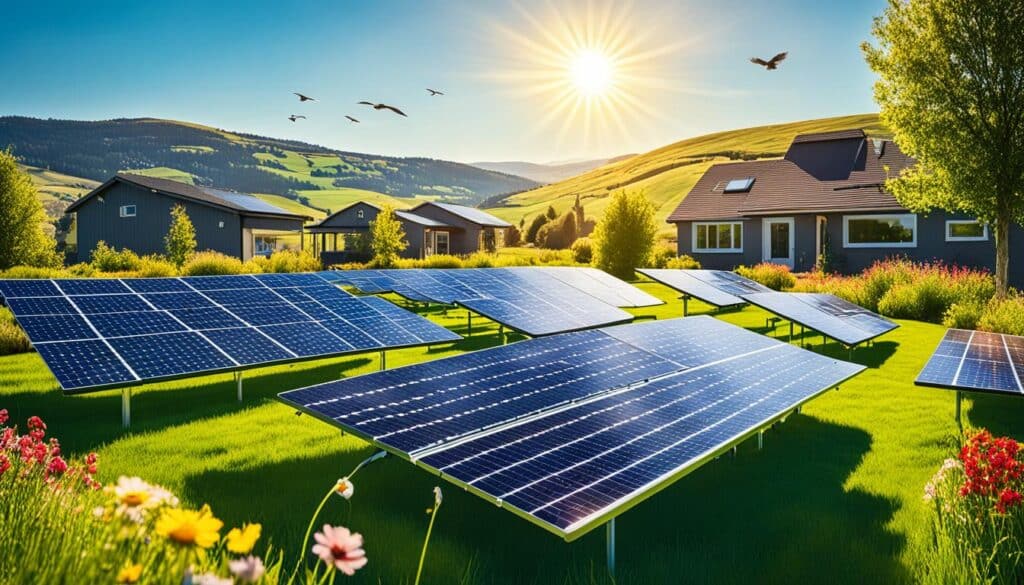
Conclusion
Geothermal energy and solar power are both valuable sources of renewable energy that contribute to sustainable power generation. These energy sources play a crucial role in reducing our reliance on traditional fossil fuels and mitigating the environmental impact of electricity generation.
Geothermal energy offers several advantages as a power source. It provides reliable base load power, ensuring a continuous and uninterrupted supply of electricity. Geothermal power plants have a long operational lifespan, making them a sustainable and cost-effective option for energy generation. With low emissions and relatively low operating costs, geothermal energy is an attractive choice for achieving sustainable power generation goals.
Solar power, on the other hand, offers clean energy with a minimal environmental impact. Solar power plants do not release greenhouse gases or air pollutants during operation, contributing to a healthier and cleaner environment. Although solar power output can be variable due to weather conditions, advancements in solar technology make it an increasingly viable and accessible option for electricity generation, both on a residential and commercial scale.
Overall, the choice between geothermal energy and solar power depends on various factors such as geographical location, energy demand, and infrastructure requirements. Both sources have their advantages and disadvantages but contribute significantly to renewable energy goals. As we continue to prioritize sustainable power generation, it is essential to explore and harness the potential of diverse renewable energy sources to create a greener and more sustainable future.
FAQ
What is the difference between geothermal energy and solar power?
Geothermal energy is generated by tapping into the Earth’s heat, while solar power is generated by harnessing energy from the sun.
How reliable is geothermal energy as a power source?
Geothermal power plants offer continuous operation and are not affected by weather conditions, making them highly reliable.
What are the advantages of geothermal energy?
Geothermal energy offers benefits such as reliability, long operational lifespan, and relatively low operating costs compared to other forms of power generation.
Does geothermal energy produce greenhouse gases or air pollutants?
No, geothermal power plants do not release greenhouse gases or air pollutants during operation, contributing to a cleaner environment.
What are the disadvantages of geothermal energy?
Some drawbacks of geothermal energy include limited availability in certain regions, the need for specific geological conditions, and the potential for groundwater contamination.
How environmentally friendly is solar power?
Solar power has a low environmental impact as it does not release greenhouse gases or air pollutants during operation, contributing to a cleaner and greener energy source.
Can solar power operate continuously?
Solar power plants can operate for long periods without interruption, although their output may vary due to weather conditions.
What are the advantages of solar power?
Solar power offers benefits such as sustainability, abundant availability, and the potential to lower electricity costs for consumers.
Are there any disadvantages of solar power?
Some disadvantages of solar power include the intermittent nature of sunlight, the need for large surface areas for extensive energy production, and the initial high installation costs.
Which energy source is better for sustainable power generation?
Both geothermal energy and solar power are valuable sources of renewable energy and contribute to sustainable power generation. The choice depends on factors such as the geographical location and specific energy requirements.




